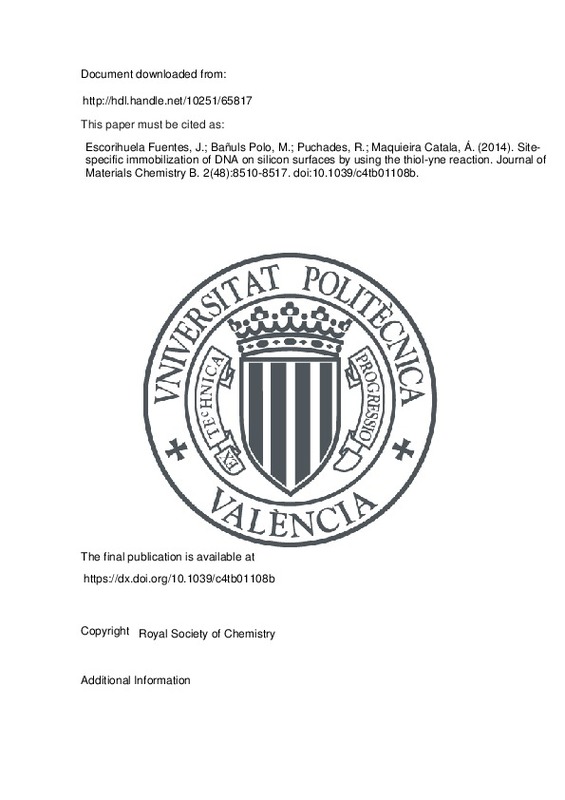JavaScript is disabled for your browser. Some features of this site may not work without it.
Buscar en RiuNet
Listar
Mi cuenta
Estadísticas
Ayuda RiuNet
Admin. UPV
Site-specific immobilization of DNA on silicon surfaces by using the thiol-yne reaction
Mostrar el registro sencillo del ítem
Ficheros en el ítem
| dc.contributor.author | Escorihuela Fuentes, Jorge
|
es_ES |
| dc.contributor.author | Bañuls Polo, María-José
|
es_ES |
| dc.contributor.author | Puchades, Rosa
|
es_ES |
| dc.contributor.author | Maquieira Catala, Ángel
|
es_ES |
| dc.date.accessioned | 2016-06-14T06:57:45Z | |
| dc.date.available | 2016-06-14T06:57:45Z | |
| dc.date.issued | 2014 | |
| dc.identifier.issn | 2050-750X | |
| dc.identifier.uri | http://hdl.handle.net/10251/65817 | |
| dc.description.abstract | [EN] Covalent immobilization of ssDNA fragments onto silicon-based materials was performed using the thiol-yne reaction. Chemical functionalization provided alkyne groups on the surface where the thiol-modified oligonucleotide probes can be easily photoattached as microarrays, reaching an immobilization density around 30 pmol cm(-2). The developed method presents the advantages of spatially controlled probe anchoring (by using a photomask), direct attachment without using cross-linkers, and short irradiation times (20 min). Hybridization efficiencies up to 70%, with full complementary strands, were reached. The approach was evaluated by scoring single nucleotide polymorphisms with a discrimination ratio around 15. Moreover, the potential applicability of the proposed methodology is demonstrated through the specific detection of 20 nM of a genomic target of bacterial Escherichia coli. | es_ES |
| dc.description.sponsorship | This research was supported by Ministerio de Ciencia e Innovacion (CTQ2013-45875-R) and Generalitat Valenciana (PROMETEO/2010/008). | en_EN |
| dc.language | Inglés | es_ES |
| dc.publisher | Royal Society of Chemistry | es_ES |
| dc.relation.ispartof | Journal of Materials Chemistry B | es_ES |
| dc.rights | Reserva de todos los derechos | es_ES |
| dc.subject | ENE CLICK CHEMISTRY | es_ES |
| dc.subject | PLASMON RESONANCE | es_ES |
| dc.subject | NUCLEIC-ACIDS | es_ES |
| dc.subject | REAL-TIME | es_ES |
| dc.subject | MICROARRAYS | es_ES |
| dc.subject | XPS | es_ES |
| dc.subject | MONOLAYERS | es_ES |
| dc.subject | FUTURE | es_ES |
| dc.subject | ARRAYS | es_ES |
| dc.subject | FUNCTIONALIZATION | es_ES |
| dc.subject.classification | QUIMICA ANALITICA | es_ES |
| dc.title | Site-specific immobilization of DNA on silicon surfaces by using the thiol-yne reaction | es_ES |
| dc.type | Artículo | es_ES |
| dc.identifier.doi | 10.1039/c4tb01108b | |
| dc.relation.projectID | info:eu-repo/grantAgreement/MINECO//CTQ2013-45875-R/ES/BIOSENSADO EN SOPORTES INTERACTIVOS CON PROPIEDADES INTERFEROMETRICAS PARA APLICACIONES CLINICAS. DEMOSTRACION EN FARMACOGENETICA Y ALERGIAS MEDICAMENTOSAS/ | es_ES |
| dc.relation.projectID | info:eu-repo/grantAgreement/GVA//PROMETEO%2F2010%2F008/ES/AYUDA PARA EL GRUPO SYM-IDM/ | es_ES |
| dc.rights.accessRights | Abierto | es_ES |
| dc.contributor.affiliation | Universitat Politècnica de València. Departamento de Química - Departament de Química | es_ES |
| dc.contributor.affiliation | Universitat Politècnica de València. Instituto de Reconocimiento Molecular y Desarrollo Tecnológico - Institut de Reconeixement Molecular i Desenvolupament Tecnològic | es_ES |
| dc.description.bibliographicCitation | Escorihuela Fuentes, J.; Bañuls Polo, M.; Puchades, R.; Maquieira Catala, Á. (2014). Site-specific immobilization of DNA on silicon surfaces by using the thiol-yne reaction. Journal of Materials Chemistry B. 2(48):8510-8517. https://doi.org/10.1039/c4tb01108b | es_ES |
| dc.description.accrualMethod | S | es_ES |
| dc.relation.publisherversion | https://dx.doi.org/10.1039/c4tb01108b | es_ES |
| dc.description.upvformatpinicio | 8510 | es_ES |
| dc.description.upvformatpfin | 8517 | es_ES |
| dc.type.version | info:eu-repo/semantics/publishedVersion | es_ES |
| dc.description.volume | 2 | es_ES |
| dc.description.issue | 48 | es_ES |
| dc.relation.senia | 278982 | es_ES |
| dc.identifier.eissn | 2050-7518 | |
| dc.contributor.funder | Ministerio de Economía y Competitividad | es_ES |
| dc.contributor.funder | Generalitat Valenciana | es_ES |







![[Cerrado]](/themes/UPV/images/candado.png)

